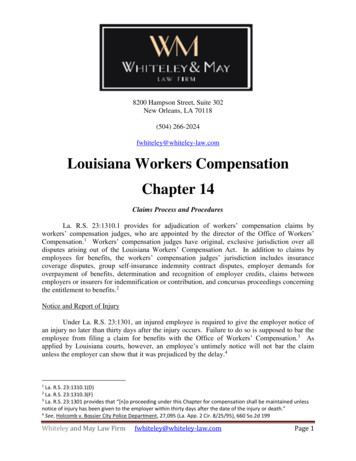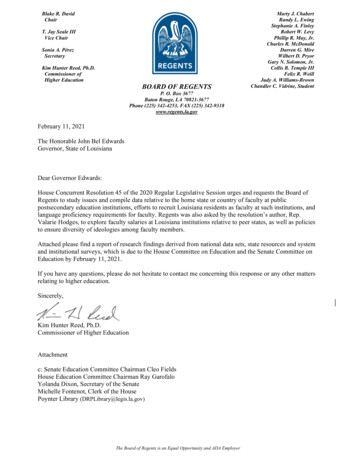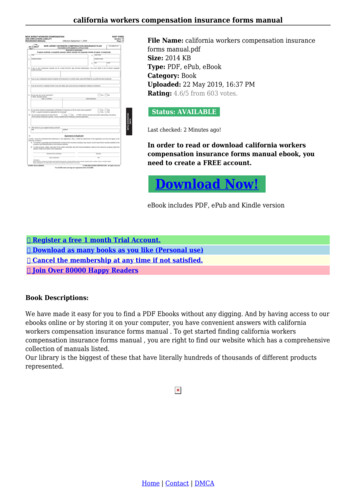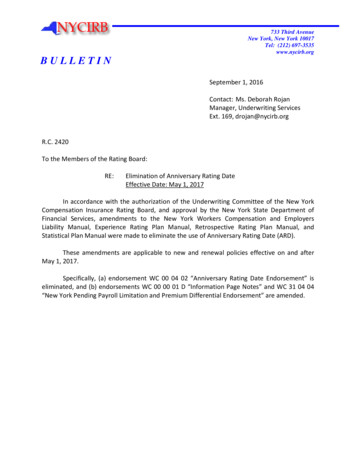
Transcription
8200 Hampson Street, Suite 302New Orleans, LA 70118(504) 266-2024fwhiteley@whiteley-law.comLouisiana Workers CompensationChapter 14Claims Process and ProceduresLa. R.S. 23:1310.1 provides for adjudication of workers’ compensation claims byworkers’ compensation judges, who are appointed by the director of the Office of Workers’Compensation.1 Workers’ compensation judges have original, exclusive jurisdiction over alldisputes arising out of the Louisiana Workers’ Compensation Act. In addition to claims byemployees for benefits, the workers’ compensation judges’ jurisdiction includes insurancecoverage disputes, group self-insurance indemnity contract disputes, employer demands foroverpayment of benefits, determination and recognition of employer credits, claims betweenemployers or insurers for indemnification or contribution, and concursus proceedings concerningthe entitlement to benefits.2Notice and Report of InjuryUnder La. R.S. 23:1301, an injured employee is required to give the employer notice ofan injury no later than thirty days after the injury occurs. Failure to do so is supposed to bar theemployee from filing a claim for benefits with the Office of Workers’ Compensation.3 Asapplied by Louisiana courts, however, an employee’s untimely notice will not bar the claimunless the employer can show that it was prejudiced by the delay.41La. R.S. 23:1310.1(D)La. R.S. 23:1310.3(F)3La. R.S. 23:1301 provides that “[n]o proceeding under this Chapter for compensation shall be maintained unlessnotice of injury has been given to the employer within thirty days after the date of the injury or death.”4See, Holcomb v. Bossier City Police Department, 27,095 (La. App. 2 Cir. 8/25/95), 660 So.2d 1992Whiteley and May Law Firmfwhiteley@whiteley-law.comPage 1
Within ten days of receiving notice of an injury, the employer is required to report theinjury to its insurer, or, if self-insured, to its claims administrator.5 The insurer or theadministrator is required to file a First Report of Injury with the Office of Workers’Compensation.6 The failure to file the First Report of Injury with the Office of Workers’Compensation could interrupt prescription on the employee’s claim for benefits.7Proceedings for CompensationLitigation before the Office of Workers’ Compensation now is similar to litigation beforedistrict courts.8 By design, however, workers’ compensation claims move much faster thanproceedings in district court. Workers’ compensation cases generally are set for trial withinthree or four months of the filing of the claim. Also, unlike district court proceedings, where amatter will remain inactive until a party moves to set the case for trial, the Office of Workers’Compensation sets a status conference to pick a trial date as soon as the defendant files anAnswer.1. Initiation of the Claim - Necessary AllegationsA claim is initiated by the filing of a Disputed Claim for Compensation.9 The claim ispremature unless it alleges one of the following:(1) The employee or dependent is not being or has not been paid the disability benefits due asa result of the injury;(2) The employee has not been furnished the proper medical attention, or the employer orinsurer has not paid for the medical attention furnished;(3) The employee has not been provided copies of medical reports after written request; or(4) The employer or insurer has not paid penalties and attorney’s fees to which the employeeis entitled.When an employee is receiving workers’ compensation disability benefits at the full rate, a claimseeking a declaration that she is permanently and totally disabled is premature because it doesnot include one of the necessary allegations. Dove v. Liberty Mutual Ins. Co., 119 So.2d 1193(La. App. 3rd Cir. 1980). This statute was used most frequently, however, to prevent anemployer from litigating contested issues while it pays workers’ compensation benefits. Forexample, in Fru-Con Construction Corp. v. Xchanging, 11-529 (La. App. 3 Cir. 12/14/11), 815La. R.S. 23:1306(A).La. R.S. 23:1306(B).7Roy v. Chris’ Steak House, Inc., 525 So.2d 630 (La. App. 3rd Cir. 5/11/98)8Previously, the Office of Workers’ Compensation had established mandatory procedures (informal conferenceand pre-trial mediation) designed to resolve disputes without litigation. In most cases, however, those proceduresjust delayed the ultimate resolution of the dispute. Now, the informal conference has been eliminated, and pretrial mediation is voluntary.9OWC form 1008.6Whiteley and May Law Firmfwhiteley@whiteley-law.comPage 2
So.3d 209, the employer filed a Petition for Declaratory Judgment based on conflicting medicalopinions as to whether the employee required additional medical treatment and could return towork. The court held that, because the petition did not contain any of the allegations in La. R.S.23:1314, the claim was premature. The employer’s only option if it disagreed with the opinionof the employee’s treating physician was to terminate benefits, at the risk of being assessedpenalties and attorney’s fees.La. R.S. 23:1314 was amended effective August 1, 2013, to allow the employer or payorto file a Disputed Claim for Compensation against an employee in two limited circumstances: (1)when the employer or payor alleges that it paid benefits that were not due because the employeecommitted fraud, and (2) when the employer or payor wishes to appeal a decision of the MedicalDirector regarding medical necessity.10 The amendment also clarified that an employer or payormay file a claim against any party other than the employee concerning any other dispute underthe Louisiana Workers’ Compensation Act.112.VenueWhen the claimant is a domiciliary of Louisiana, proper venue is (1) the judicial districtof the parish of the claimant’s domicile at the time of injury; (2) the judicial district where theinjury occurred; or (3) the judicial district of the parish of the principal place of business of theemployer.12 The word “claimant” refers to the employee, no matter who files the claim. Ryderv. Rowan Companies, Inc., 845 So.2d 540 (La. App. 1 Cir. 2/26/03). Even when the employee isnot a party, the claimant, for venue purposes, is the injured employee.When the claimant is not a domiciliary of Louisiana, and the injury occurred inLouisiana, proper venue is the judicial district of the parish where the injury occurred.13 Whenthe claimant is not a domiciliary of Louisiana, and the injury did not occur in Louisiana, propervenue is the judicial district of the parish where the contract of employment was made or inwhich the employment was principally located.143.AppealThe decision of a workers’ compensation judge may be appealed to the Louisiana Courtof Appeal for the district from which the decision arose. 15 The delays for appeal are the same asin district court. A suspensive appeal must be filed within thirty days, and a devolutive appealmust be filed within sixty days.16 An order for physical therapy or work hardening, however,may not be suspended while an appeal is pending.17 Also, when the workers’ compensationjudge rules that delaying a surgery would, more likely than not, result in death, permanent10La. R.S. 23:1314(E)(1)La. R.S. 23:1314(E)(2)12La. R.S. 23:1310.4(A)(2)13La. R.S. 23:1310.4(A)(3)14La. R.S. 23:1310.4(A)(3)15La. R.S. 23:1310.5(A)(2)16La. R.S. 23:1310.5(B)17La. R.S. 23:1310.5(E)(1)11Whiteley and May Law Firmfwhiteley@whiteley-law.comPage 3
disability or irreparable injury the claimant, any appeal of a judgment awarding surgery will behandled on an expedited basis.18Continuing Jurisdiction and Modification of JudgmentsRes Judicata has limited application in workers’ compensation cases. A judgmentdenying benefits is res judicata after the claimant has exhausted the rights of appeal.19 Regardingany other judgment, however, the jurisdiction of the workers’ compensation judge iscontinuing.20 On the application of a party and after a contradictory hearing, the judge maymake any modifications or changes regarding former findings or orders that the judge findsjustified.21A judgment awarding benefits also may be modified based on a change of conditions.22A modification proceeding is initiated on the motion of a party and requires a contradictoryhearing.23 If the judge finds that it is warranted by a change of conditions, the judge mayterminate, decrease or increase the compensation previously awarded.24 A petition to modify issubject to the prescriptive periods set forth in La. R.S. 23:1209.25SettlementsThe stated policy of the Louisiana Workers’ Compensation is that it is in the best interestof the injured worker to receive benefits on a periodic basis.26 Despite that stated policy,settlement is allowed when all parties (employee, insurer and employer27) agree, and workers’compensation judge confirms that the settlement is clearly in the best interest of the parties.28When the employee is represented by counsel, the workers’ compensation judge has nodiscretion in this regard. If the settlement documents verify that the employee’s attorney hasexplained the employee’s rights and the consequences of the settlement to the employee, theworkers’ compensation “shall” approve the settlement.29 When the employee is not representedby an attorney, however, the workers’ compensation judge may refuse to approve a settlement ifthe judge finds that the employee does not understand the terms and conditions of the settlementor that the settlement does not provide substantial justice to all parties.30The settlement agreement must be presented to the workers’ compensation judge forapproval through a signed and verified petition or by recitation and acknowledgment of the terms18La. R.S. 23:1310.5(E)(2)La. R.S. 23:1310.8(E)20La. R.S. 23:1310.8(A)(1)21Id.22La. R.S. 23:1310.8(B)23Id.24Id.25See, Chapter 15, Prescription26La. R.S. 23:1271(A)27The insurer is not allowed to settle without the employer’s consent.28La. R.S. 23:1271(A)29La. R.S. 23:1272(B)30La. R.S. 23:1272(C)19Whiteley and May Law Firmfwhiteley@whiteley-law.comPage 4
of the settlement on the record in open court.31 A workers’ compensation settlement is notenforceable unless it has been presented properly and approved by a workers’ compensationjudge. Once the settlement is approved, however, it can only be set aside or modified for fraudor misrepresentation.32The Louisiana Workers’ Compensation Act allows two types of settlement of workers’compensation claims: (1) compromise settlements and (2) lump sum settlements. A compromisesettlement resolves a dispute between the parties. In other words, if the parties disagree as towhether the employee is entitled to benefits or as to the amount of any benefits owed, the partiesmay agree to resolve that dispute through a payment by the employer or insurer to the employee.A compromise settlement may be for any amount agreed on by the parties.A lump sum settlement is an agreement by the parties that workers’ compensationbenefits admittedly due to the employee will be paid in a lump sum, rather than on a periodicbasis. A lump sum settlement must be for the full value of the employee’s claim, discounted atno more than 8%. The penalty for discounting payments by more than 8% is one and one-halftimes the compensation due, less the amount already paid. 33 For example, if the full value of theemployee’s claim, discounted at 8%, is 100,000.00, and the parties enter into a lump sumsettlement for 50,000.00, the employee would be entitled to a penalty of 100,000.00 inaddition to the amount previously received in the settlement. (Full value [ 100,000.00] x 1.5 150,000.00; 150,000.00 – the settlement amount [ 50,000.00] 100,000.00 penalty). Theemployee must make a claim for the penalty within two years of the lump-sum payment.Because of the potential penalty, lump sum settlements are rare. If there is no arguabledispute, however, a court could find that a settlement labeled as a compromise settlement was, infact, a lump sum settlement. For example, if an employer has taken the social security offset, theemployer has stipulated that the employee is permanently and totally disabled.34 Therefore, anysettlement of a claim involving a social security offset must be for the full value of the claim,discounted at no greater than 8%, regardless of whether the settlement is labeled as acompromise settlement or a lump sum settlement.31La. R.S. 23:1272(A)La. R.S. 23:1272(B) and (C)33La. R.S. 23:1274(B)34See Ch. 13, Credits and Offsets32Whiteley and May Law Firmfwhiteley@whiteley-law.comPage 5
Louisiana Workers Compensation Chapter 14 Claims Process and Procedures La. R.S. 23:1310.1 provides for adjudication of workers' compensation claims by workers' compensation judges, who are appointed by the director of the Office of Workers' Compensation.1 Workers' compensation judges have original, exclusive jurisdiction over all










